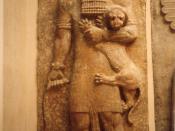Suffering has been described as, to undergo or to feel pain or to sustain injury or loss. When the lives of Gilgamesh, Enkidu and Job are placed one a comparative level, clearly on can see that they all suffered some loss or pain. When one examines further their loss or pain, evidently their suffering is placed on different levels as they differ in their intensity even though their suffering share some of the same characteristics. Therefore it can be argued that Gilgamesh, Enkidu and Job all suffered but the result Gilgamesh and Enkidu's sufferings were self-inflicted by a self serving quest to obtain glory, honour and immortality whereas Job's suffering was inflicted upon him by Satan with the permission God to prove a point that Job, no matter his suffering would not curse God and would remain faithful, "But put forth thine hand now, and touch all that he hath, and he will curse thee to thy face."�
(Job 1:11) In "The Epic of Gilgamesh"�, Gilgamesh was a powerful figure, a king who was not very good to his people. Gilgamesh was self-serving whereas the gods should be the ones being served. This type of treatment towards the gods proved to be extremely devastating to the fate of Gilgamesh and his close companion Enkidu. With the power that he had, Gilgamesh often tyrannized his people; he would triumph over men in combat and claimed the right to sleep with any woman before her marriage, "[Gilgamesh] lets [no] girl go free to [her bridegroom]"� (I. 76.) He was unmatched among warriors and loves athletic contests especially because he knew of no one who could beat him; ""æhe has no equal when his weapons are brandished"æ"� (I. 82) "The young men of Uruk he harries without warrant (I. 67)."...


